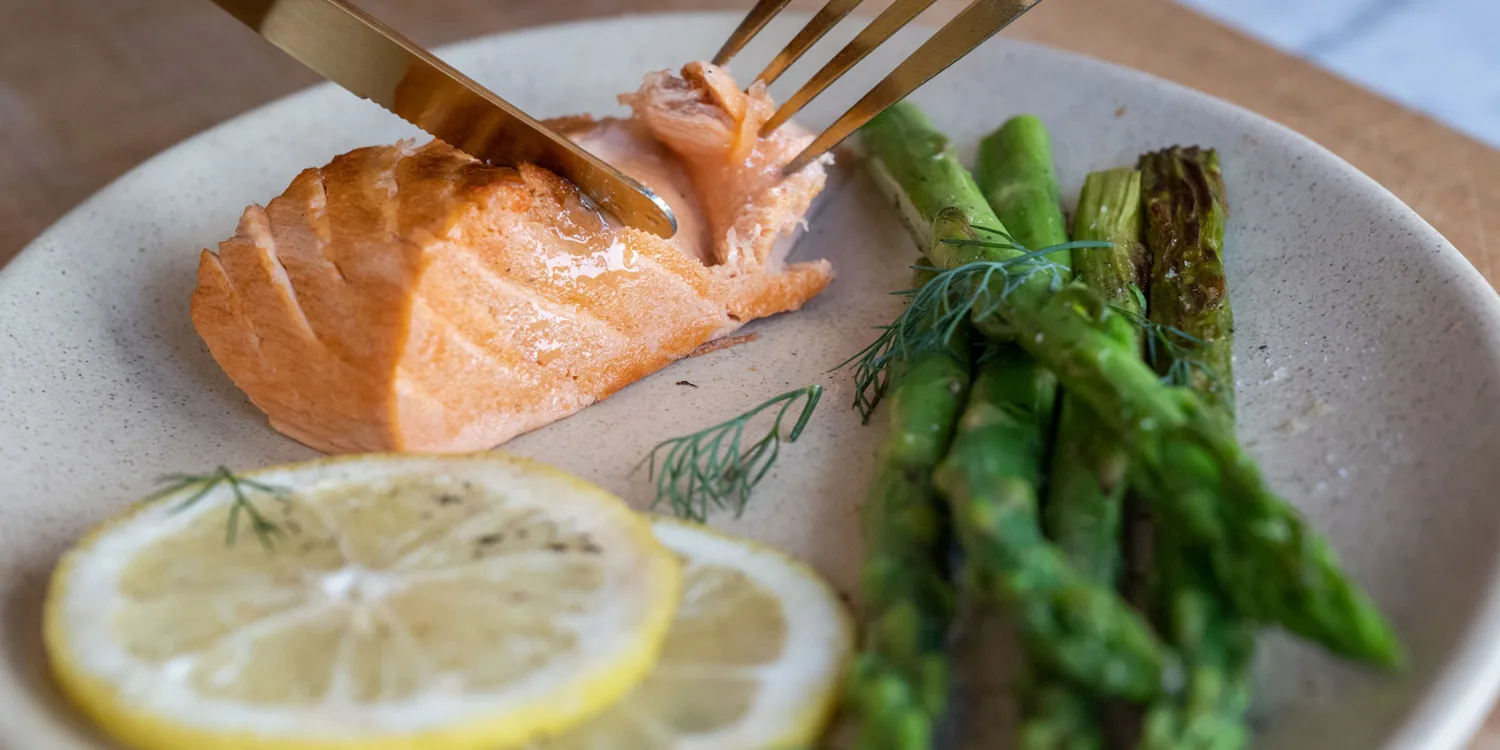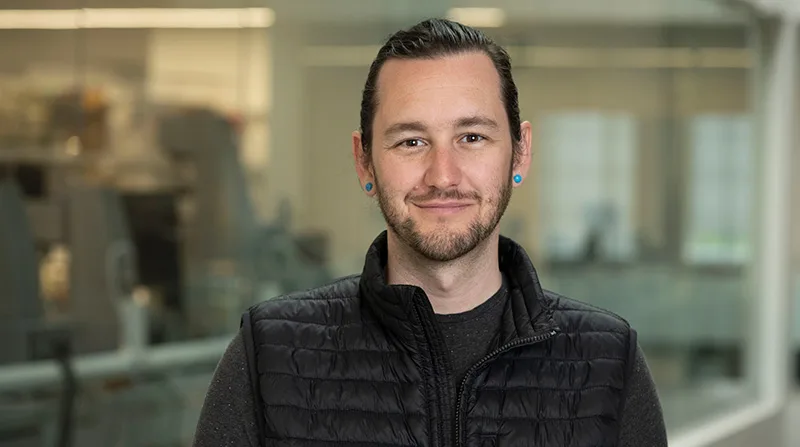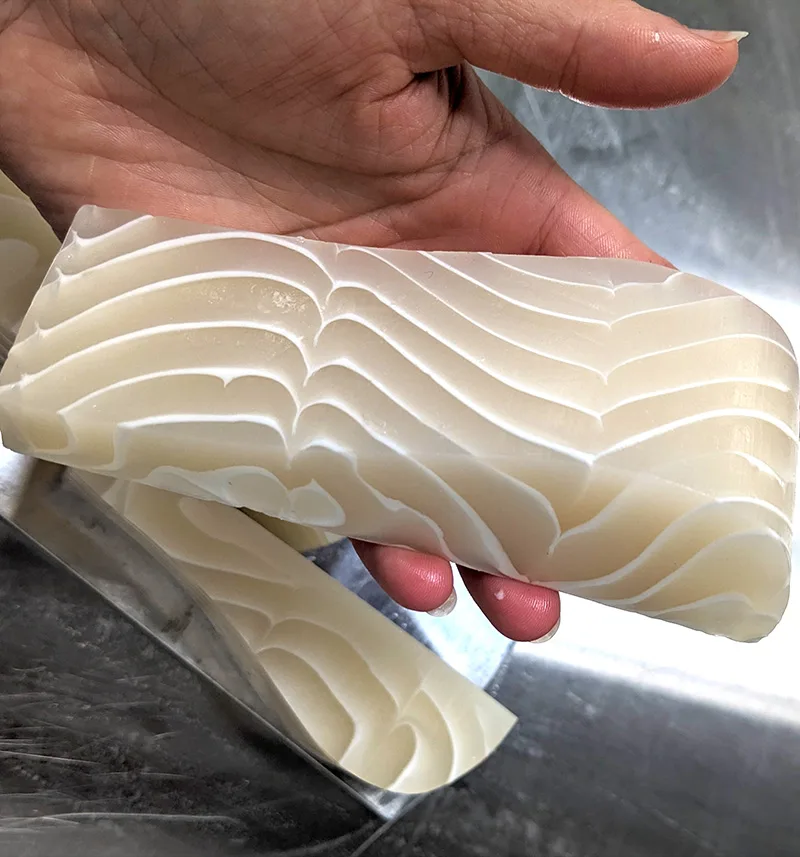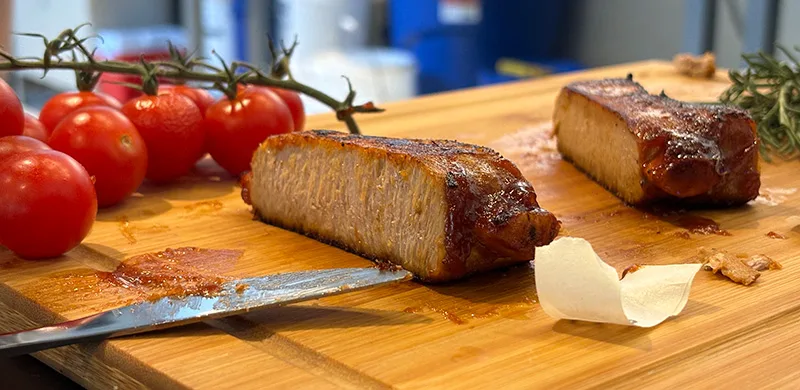This Toronto company is on a mission to completely re-invent vegan meat
By Jason McBride | August 8, 2025

New School’s plant-based salmon looks, cooks and tastes (almost) like the real thing. Now, the startup is working to expand its product line to include everything from pork ribs to steaks.
Toronto is a pretty good place to be a vegan. There’s excellent plant-based restaurants (Gia, Planta, Avelo), bakeries (Bad Attitude) and delis (Aunty Em’s). Honey’s, arguably the most delicious dairy-free ice cream ever scooped, is made here, and the city’s even the birthplace of Vegandale, North America’s largest vegan festival.
But if the plans of one ambitious startup pan out, Hogtown could become the centre of the entire plant-based universe. New School Foods, a food manufacturing and technology company headquartered at Dufferin and Queen, is trying to completely re-invent the idea of vegan meat.
Almost all other current alt-protein companies, including the most famous, Beyond Meat and Impossible Foods, make their products using extrusion — that is, pushing ingredients through a die to make burgers, sausages or nuggets. New School’s first product, on the other hand, is a plant-based salmon fillet that has been engineered to look, cook and taste uncannily like the real thing.

One of the most famous strategies in tech is, fail fast and iterate,” says Chris Bryson, founder of New School Foods. “You can’t do that with food. If you leave a bad taste in someone’s mouth, they won’t come back.”
Founded in 2020 by entrepreneur Chris Bryson, New School began serving its faux fish last fall at the Toronto plant-based diner, Stefano’s. It will soon be available at about 30 different spots across Canada, including the Gladstone Hotel, Sushi Momo and Jackson-Triggs Winery. A salmon burger, derived from the fillet trimmings, is also currently making its way onto menus, and the company is now eyeing the American market.
But for Bryson, salmon is just the beginning. New School is currently developing a half-dozen additional whole-cut products, everything from pork ribs to steaks. It’s also in the process of scaling up its testing, production and processing facilities. The company currently manufactures a thousand fillets and 1,500 burgers a day. It plans to make 10 times that amount by the end of next year.
A decade ago, Beyond Meat and Impossible Food promised to transform our eating habits. That shift never happened — Beyond’s stock tanked and meat consumption hasn’t budged. Meanwhile, the climate and health problems their products were supposed to mitigate have only gotten worse. Can New School’s salmon revive the plant-based revolution?

Seaweed extracts like agar form the “muscle” of New School’s plant-based salmon fillets.
Building a better fish
Before Bryson launched New School, he founded Unata, an e-commerce platform for small and mid-size grocery stores. He sold that company to Instacart in 2018 for a reported U.S.$65 million. Soon after, he had a moment of quiet radicalization; he became obsessed with the ethical and environmental ills of factory farming and started thinking of ways to fix the system. “It felt like a big problem no one wanted to talk about,” he says. He began putting his money into alt-meat startups.
But Bryson, who’s been vegan for seven years, was frustrated by the limited imagination of the industry. Extrusion was the name of the game, but Bryson felt that alternative meats weren’t convincing or tasty enough. Too many products, he says, were being rushed to market by tech investors eager to cash in on the Beyond/Impossible hype. “One of the most famous strategies in tech is, fail fast and iterate,” he says. “You can’t do that with food. If you leave a bad taste in someone’s mouth, they won’t come back.”
Bryson had a hunch that there was a better way. He approached some of the most renowned university food science departments in the world, offering to fund the best ideas they could come up with. Most told him avoiding extrusion was impossible.
Then he received a compelling proposal from the Toronto Metropolitan University and Professor Dérick Rousseau’s Food and Soft Materials Research Group. Rousseau’s team proposed developing a novel process based on the work of food scientist Auke de Vries, which allowed them to simulate the muscle fibres and connective tissue of animal proteins. New School set up shop at TMU. And after two years of collaboration and another 12 months of R&D, Bryson had a prototype.
The science of pseudo-salmon
While New School has spent countless hours and millions of dollars perfecting its recipe, making the salmon is a relatively straightforward process. First, they whip up a kind of cruelty-free Jell-O using seaweed extracts like agar to form the “muscle” of the fillet. A different gel is then applied in thin white lines, creating the “fat.” These lines do multiple jobs: they help the fillet resemble the real thing and provide flavour. They also melt at a different temperature than the “muscle,” allowing the fillet to flake and fall apart. Another machine helps solidify the gel into the fillet shape.
The next step is arguably New School’s biggest innovation. A plate freezer, the exact same machine used to flash-freeze real fish, freezes the gel-fillet from bottom to top, creating a kind of honeycomb structure of ice. When the ice melts, it leaves behind channels that are infused with flavours, colours and proteins. “We specifically freeze it in a way where we can control the width and resistance of the muscle fibre so we can emulate whatever species we’re trying to create,” Bryson says. “All meat and fish is just muscle fibre and connective tissue in different combinations.”
Bryson’s team experimented with chickpeas, soy and sunflower seeds, but learned that potato protein creates the best flavour. While the fillet doesn’t have quite the same protein per gram as regular salmon, it does have comparable Omega-3 fatty acids. “That’s one of the main reasons people eat salmon — for the nutritional benefits, the brain candy,” Bryson says. “We wanted to make sure, pound for pound, it was the same.”

The company is developing other whole-cut products, including pork ribs.
But, really, how does it taste?
“It’s freakishly close,” says Brodie Somerville, who owns two vegan restaurants in Montreal, the Asian-influenced Café Natsu and comfort food spot, Maynard’s. “Flavour, texture and smell — it hits all the notes.” At Natsu, New School’s salmon is the only fake meat Somerville includes on his menu, where it’s currently served with zucchini and a Thai green curry. It’s one of the restaurant’s most popular items, but its fidelity to the real thing can be divisive. “Non-vegans find it trippy,” says Somerville, “but some vegans really dislike it because it’s too close.”
Getting that omnivore buy-in, though, is Bryson’s real goal. “We’re still not fooling 10 out of 10 people,” he says. “We want to get there.” New School has made 27 different versions of the fillet so far, with the latest iteration Bryson characterizing as “more oceanic, briny.”
Spawning the future of food
Hanging in the front office of New School’s headquarters is a gallery of framed photographs of fake meat. Some of them have straightforward names, “Haddock Alpha” and “Ribs 3.0,” while others, like “Faulet Mignon,” are labelled with the groan-inducing puns all-too-common in the vegan world. All of them are products that the company currently has in development, and hopes to bring to market soon. For Bryson, the possibilities are practically endless.
The company is shopping its salmon at every possible place that might have food service: schools, entertainment venues, even the Toronto Zoo. While Bryson eventually plans to make the salmon available at grocery stores, he’s in no hurry, and wants to build “brand credibility” first.
He also wants to command a bigger slice of the U.S.$108 billion global alt-protein market. As part of the expansion, he’s created a larger parent company NS/TX Industries (NS/TX being New School Textures), with the New School brand being the consumer-facing unit alongside R&D and tech platform arms. Bryson’s hope is that other alt-protein companies, once they recognize the value and flexibility of New School’s operation, will be eager to partner with them on co-branded products and other opportunities.
“We think that, long term, this is a better way to make meat alternatives,” he says. The company has already raised U.S.$18 million from the likes of Ikea, Lever VC and Alwyn Capital.
“The cool thing about alternative protein is, if you can create a great product, you can create change, without asking someone to completely change their lifestyle,” Bryson says. “We’re not going to convince people to go vegan. But if we want a sustainable food system, and we make better products, then that will actually make a difference.”
Find out how MaRS supports technology ventures, investors and other organizations to accelerate the adoption of high-impact solutions to some of the world’s most pressing issues.
Photos courtesy of New School Foods
 Jason McBride
Jason McBride